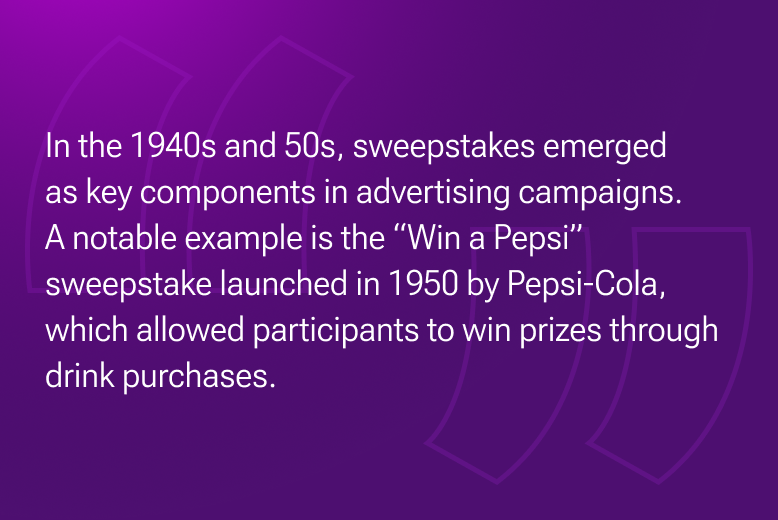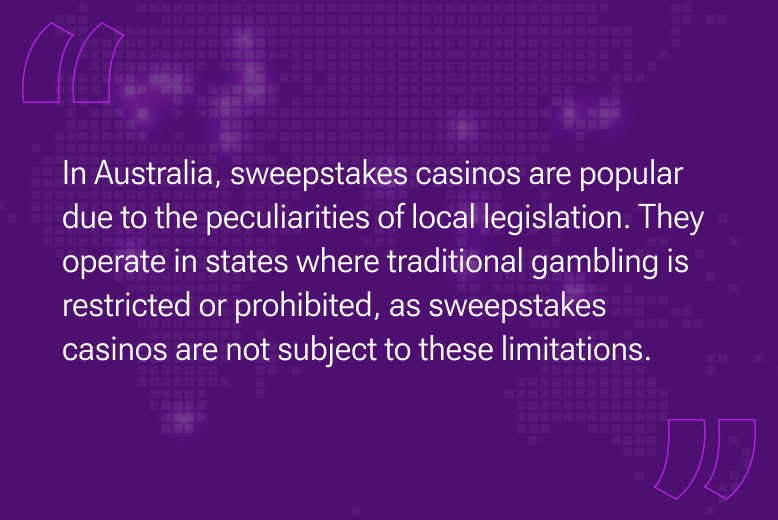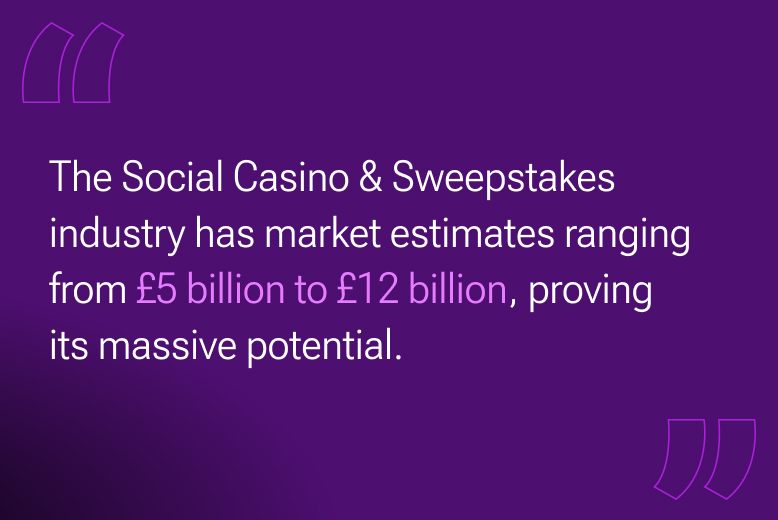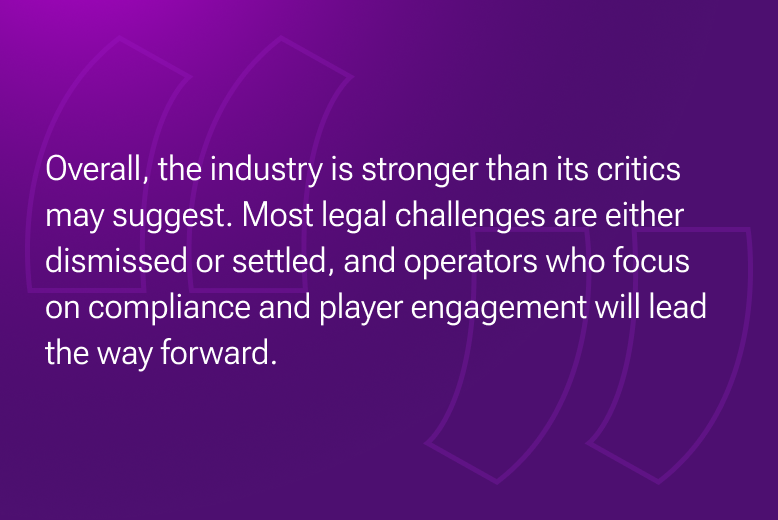Sweepstakes and lotteries, widely recognized as prize draws, capture the fascination of countless individuals globally. Eye-catching online banners invite users to complete a form, providing them with an opportunity to win enticing prizes. Within the iGaming industry, sweepstakes are gaining increasing popularity, offering players unique mechanics and engagement that blend gaming excitement with the chance for significant wins.
In essence, a sweepstake functions as a lottery, with the primary objective of conducting a prize drawing. To enter these events, participants typically share personal details such as their full name, email address, phone number, residence, and interests. In recent years, sweepstakes have surged in popularity, becoming integral to numerous marketing strategies employed by various companies.
A Quick Trip Down History Lane
The origins of sweepstakes can be traced back to the early 20th century, with the first recorded event occurring in 1930 in the United States. Organized by “The New York Times,” this sweepstake aimed to attract new readers. Individuals had to fill out a coupon for the chance to win significant monetary rewards and other prizes. This successful initiative paved the way for the subsequent rise of sweepstakes in other media outlets and companies.
As time passed, sweepstakes became more structured, leading to the establishment of strict regulations governing their execution. The 1930s witnessed the introduction of the first legal guidelines in the U.S. aimed at overseeing such events. This legal framework provided safeguards for both participants and organizers, which in turn encouraged heightened interest in sweepstakes as a marketing tool.
In the 1940s and 50s, sweepstakes emerged as key components in advertising campaigns. A notable example is the “Win a Pepsi” sweepstake launched in 1950 by Pepsi-Cola, which allowed participants to win prizes through drink purchases. This strategy not only increased sales but also elevated brand awareness.

One of the most iconic sweepstakes in history is “Publisher’s Clearing House,” established in 1967. Initially created to promote magazine subscriptions, the company soon began implementing cash prize draws. The aggressive promotion efforts during the 1980s led to an explosion in popularity, making their sweepstakes a staple on television and radio. Even today, their competitions continue, with some winners gaining celebrity-like status.
Reasons for the Popularity of Sweepstakes
Several factors explain the widespread appeal of sweepstakes:
- Ease of Participation: Engaging in sweepstakes often requires minimal effort, as individuals typically just fill out a form or subscribe to a newsletter, making entry straightforward.
- Winning Potential: The allure of substantial prizes—such as cash, cars, or vacations—entices people. Even when the odds are against them, the prospect of winning sparks excitement.
- Interactive Engagement: Many brands utilize sweepstakes to foster connections with their audience. Feedback loops through surveys and competitions nurture deeper customer involvement.
- Effective Marketing Tool: Sweepstakes serve as powerful instruments for data collection, expanding subscriber lists, and cultivating customer loyalty.
Categories of Sweepstakes
Sweepstakes come in various formats, purposes, and structures. Here are some of the main categories:
- Instant Win Promotions: In these events, participants can win prizes immediately upon entry. This can involve entering special codes or utilizing scratch-off tickets that yield instant rewards.
- Scheduled Draws: Participants submit entries, and a drawing takes place at a predetermined time, which can be weekly, monthly, or annually to select winners.
- Collaborative Sweepstakes: These events are organized jointly by several brands or companies, allowing participants the chance to win prizes from multiple sponsors.
- Digital Sweepstakes: With the rise of the internet, many sweepstakes are now held online, where participants can sign up and enter via websites or mobile apps.
- Lottery-style Sweepstakes: Some sweepstakes operate like lotteries, requiring participants to buy tickets to enter, with the potential for significant prizes that attract a large audience.
- Social Media Contests: These giveaways occur on platforms like Facebook and Instagram, where participants enter by completing specific tasks, such as liking or sharing posts.
- Charity-focused Sweepstakes: These events aim to raise funds for non-profit organizations, where participants contribute donations for a chance to win prizes.
Regional Variations

United States: A notable example of sweepstakes in the U.S. is the “Publishers Clearing House” giveaway, which distributes millions annually. Many Americans aspire to win, fueling their motivation to participate. Other popular sweepstakes platforms include Sweepstakes Advantage, which lists various giveaways, and LuckyLand Slots, where players can enter sweepstakes for cash prizes and other rewards. These platforms have gained significant traction among users looking for exciting ways to win.
Europe and the United Kingdom: Sweepstakes in Europe also capture attention, particularly in the UK, where televised lotteries are very popular. Shows like “The National Lottery” give participants the chance to win large sums of money.
Asia: In Asia, the popularity of sweepstakes has soared due to digital innovations. For instance, mass giveaways on e-commerce platforms in China attract massive participation, driving sales and enhancing brand visibility.
Australia: In Australia, sweepstakes casinos are popular due to the peculiarities of local legislation. They operate in states where traditional gambling is restricted or prohibited, as sweepstakes casinos are not subject to these limitations. Platforms like Chumba Casino and LuckyLand Slots offer players the chance to win real money and valuable prizes, such as cars or gift cards, reflecting the growing enthusiasm for sweepstakes in the region.
Developers of Sweepstakes
Creating and overseeing sweepstakes demands considerable expertise in marketing, legal regulations, and technology. Typically, teams that manage these events include marketing professionals, legal advisors, and IT specialists. They focus on developing the concept, establishing rules, executing marketing plans, and ensuring compliance with laws.
Recently, a wave of startups has emerged, offering cutting-edge solutions for sweepstakes. Some utilize blockchain technology to enhance transparency and fairness in the drawing process. This is particularly relevant in a time when trust in organizers is waning, and such advancements can help instill confidence in participants.
Sweepstakes in iGaming

Sweepstakes have also found their place in iGaming, becoming one of the most popular formats of gambling in recent years. By combining elements of traditional lotteries with mechanics familiar from online casinos and video games, sweepstakes provide a unique gaming experience that attracts the attention of both players and developers. The Social Casino & Sweepstakes industry has market estimates ranging from £5 billion to £12 billion, proving its massive potential. Though regulatory clarity may be needed to unlock even more investment.
What is a sweepstake in Igaming? It is a specific type of gambling in which players can win prizes or cash without needing to place real bets. Participation in sweepstakes often involves the purchase of “packets” that give the opportunity to engage in various contests and games. This can differ significantly from traditional gambling, as sweepstakes often operate within legal frameworks that allow them to avoid certain restrictions associated with gambling.
In most cases, the mechanics of sweepstakes in iGaming offer players the chance to acquire virtual currency or tickets, which can be used in various games. Participating in games of chance, quests, or tournaments where potential winnings can be real creates additional motivation for players. As a result, every move they make can lead to exciting outcomes, whether it be winning or simply enjoying unforgettable moments from the gaming process. However, the appetite for mergers and acquisitions (M&A) is evident; investors are keen but are waiting for the right moment to act.

One of the significant advantages of sweepstakes is the opportunity to engage in gambling with lower financial risks, as real bets are not always required. Players can test their skills and participate in games without significant investments, making sweepstakes appealing to a wide audience. Yet, payments remain a hurdle. While banks and payment service providers (PSPs) can create difficulties, solutions such as cryptocurrency and pay-by-bank options could pave the way for a more resilient ecosystem.
However, despite numerous advantages, sweepstakes are not without risks. They operate in a field where legislation can be uncertain, and companies offering such games must closely adhere to regulatory norms. Additionally, considering the presence of gambling elements, there is a possibility of addiction arising. Responsible gaming thus becomes a necessary aspect of the gambling entertainment industry.
Game content is evolving rapidly. Social casino players are increasingly seeking more than just traditional casino-style games. The demand for social, viral, and interactive experiences suggests that this could be the future of the industry. It is also worth noting that global markets could be opening up, with Brazil, Latin America, and Australia being ripe for expansion, yet localisation will be the key to success.
Overall, the industry is stronger than its critics may suggest. Most legal challenges are either dismissed or settled, and operators who focus on compliance and player engagement will lead the way forward. Sweepstakes in iGaming open new horizons for entertainment and audience engagement. Engaging mechanics, the chance to win prizes, and their accessibility make them popular among players. This is just the tip of the iceberg. The energy and momentum behind this industry are undeniable, which undoubtedly means that sweepstakes will continue to develop and evolve in the future.
Expectations for 2025
- Expansion of Online Platforms: An ongoing trend is the shift towards digital sweepstakes, with participants entering through mobile apps and social media.
- Technological Integration: The adoption of technologies like blockchain will improve transparency and security in sweepstakes.
- Increased Personalization: Marketing tactics will focus on tailoring experiences to individuals, making sweepstakes more attractive.
- Emergence of New Formats: Companies are likely to introduce innovative sweepstake formats, offering better odds of winning to engage more participants.
- Tighter Regulations: Stricter global oversight of sweepstakes will likely arise, ensuring participant rights are protected and fostering greater trust in organizers.





 Upd: 21 March 2025
Upd: 21 March 2025 






















